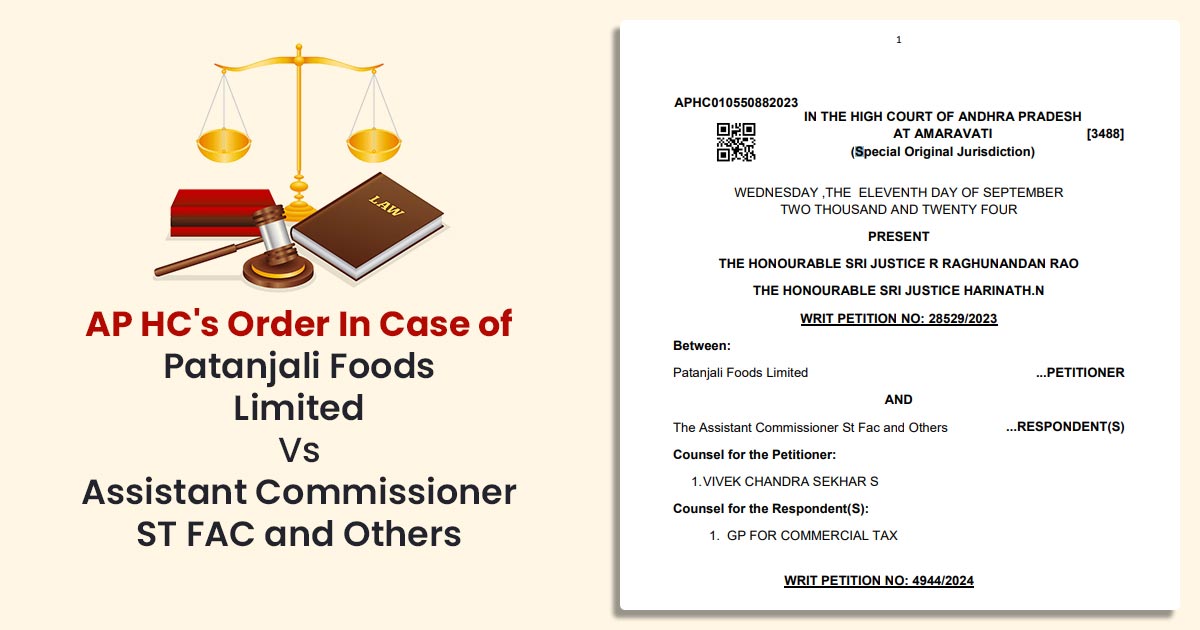
The Andhra Pradesh High Court said that the National Company Law Tribunal (NCLT) order prevails over Goods and Services Tax (GST) demand, even if the state government is not informed concerning the pending NCLT proceedings.
The Division Bench of Justices R. Raghunandan Rao and Harinath N. marked that “the contention of the department that the order of NCLT is not binding on the State of Andhra Pradesh given Section 88 of the GST Act would have to be negatived in as much as Section 238 of the Insolvency and Bankruptcy Code provides for a non-obstante clause overriding all other laws.”
Section 88 of the GST Act, 2017 furnishes that when a company is being affected then the appointed liquidator should notify the commissioner within 30 days of the appointment. Post required inquiries the commissioner would report to the liquidator within 3 months of tax, interest, or penalty that ought to be provided for.
Post liquidation if a private company’s tax, interest, or penalty cannot be recovered its directors in the duration when the tax was to get paid are jointly and severally liable unless they can establish that the non-recovery was not undergone as of their neglect, misfeasance, or breach of duty.
Section 238 of the Insolvency and Bankruptcy Code, 2016 forms that the IBC’s provisions take precedence over other laws in the event of a conflict.
Facts of the case:
The company (applicant/taxpayer) faced financial difficulties and went through insolvency proceedings under the Insolvency and Bankruptcy Code, of 2016. During these proceedings, the company’s creditors developed a resolution plan, which was approved by the National Company Law Tribunal (NCLT), Mumbai, on 4th September 2019. According to this plan, all of the company’s debts, including those owed to the government, would be settled using funds provided by the successful applicants in the resolution process.
The company changed management and resumed its operations. It had previously registered its Kakinada and Ampapuram plants under the AP VAT Act. These registrations were transferred to the GST regime, and the company operated under two separate GST registrations for its Kakinada plant and Ampapuram plant.
Thereafter, the company obtained two tax demand-cum-adjudication orders. The first came from the Assistant Commissioner in Kakinada, requiring payment of Rs. 20,21,420 in taxes, interest, and penalties for the period from July 2017 to March 2020. The second was issued by the Deputy Commissioner in Vijayawada, seeking Rs. 2,87,15,819 for the same period. The taxpayer has contested these orders/notices of demand before the Andhra Pradesh High Court.
The taxpayer argued that they are not obligated to pay any of the mentioned amounts because of the National Company Law Tribunal’s ruling. The resolution plan, which was sanctioned by the NCLT, included a payment of Rs. 25 crores to settle all statutory dues, including claims by government authorities. If this offer is approved, the taxpayer would not have to settle any of the statutory dues outlined in the plan.
Read Also: AP High Court Condones Delays of More Than 100 Days in Filing GST Appeal
The Department argued that the NCLT’s order would not be binding on the State of Andhra Pradesh because the state did not receive any notice regarding the insolvency proceedings before the NCLT. While notices and proceedings before the NCLT, Mumbai Bench were published in newspapers nationwide, no such publication was made in any newspaper circulating in Andhra Pradesh.
Observations of the High Court:
The bench referred to the case of Ghanshyam Mishra and Sons Pvt. Ltd. Vs. Edelweiss Asset Reconstruction Company [(2021)9 SCC 657] where the question of extinguishment of liability of corporate which has undergone the CIRP process was considered by the Supreme Court. It was held that “once a resolution plan is duly approved by the adjudicating authority under sub-section (1) of Section 31, the claims as provided in the resolution plan shall stand frozen and will be binding on the corporate debtor and its employees, members, creditors, including the Central Government, any State Government or any local authority, guarantors and other stakeholders. On the date of approval of the resolution plan by the adjudicating authority, all such claims, that are not a part of the resolution plan, shall stand extinguished and no person will be entitled to initiate or continue any proceedings concerning a claim, that is not part of the resolution plan.”
It was mentioned by the bench that the obligation of the taxpayer emerging of the AP VAT Act or the GST Act stands extinguished to the extent of its liability up to the NCLT Order i.e. 4th September 2019.
It was mentioned by the court that the department said that the NCLT order is not binding on the A.P. state as per Section 88 of the GST Act and shall need to be unacceptable in as much as Section 238 of the Insolvency and Bankruptcy Code furnishes for the non-obstante clause overriding all other laws.
“The further contention of the department that the order would not be binding as no notice had been given to the State of Andhra Pradesh before passing of the said order would also have to be negatived as such the plea only, can be taken for setting aside the said order. It must be held that as long as the said order holds, it would not be open for any person, who is bound by the order, to contend that such an order is not binding,” added the bench.
The bench permitted the petition concerning the aforesaid.
| Case Title | Patanjali Foods Limited Vs Assistant Commissioner ST FAC and Others |
| Citation | Writ Petition Nos.28529 of 2023 & W.p.no.4944 of 2024 |
| Date | 11.09.2024 |
| For Petitioner by | Vivek Chandra Sekhar S |
| For Respondent By | GP for Commercial Tax |
| Andhra Pradesh High Court | Read Order |









